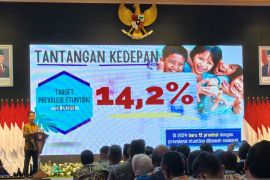Several success stories abound over the implementation of the stunting prevention program in various regions. This makes us optimistic that the government's target is achievable as plannedJakarta (ANTARA) - The government is confident of reducing the stunting rate to below 20 percent by 2024, Bambang Widianto, deputy in charge of human development and development equality at the Vice Presidential Secretariat, stated.
"Several success stories abound over the implementation of the stunting prevention program in various regions. This makes us optimistic that the government's target is achievable as planned," Widianto noted in a statement here on Wednesday.
The stunting prevention program has also yielded success in Banggai in Central Sulawesi and Sumenep in Madura Island, East Java Province.
The stunting prevention program is a national priority program, he affirmed while speaking at a coordination meeting on accelerated efforts to prevent stunning held on July 1-4, 2019.
Widianto highlighted the need for the central and regional governments to cooperate to help make the stunting program a success.
According to a study conducted by the National Development Planning Agency (Bappenas), a high stunting rate could inflict state losses worth some Rp250-300 trillion, or three percent of the gross domestic product (GDP) annually.
Related news: Prevalence of stunting down to 30.8 percent
Related news: Poverty is the main cause of stunting: minister
In the meantime, in 2015, world leaders charted a new set of Sustainable Development Goals (SDGs), of which the second aims to “end hunger, achieve food security and improved nutrition, and promote sustainable agriculture” by 2030.
The World Health Organization (WHO) has indicated that stunting affects some 162 million children globally. The World Health Assembly, the WHO's decision-making body, drafted the resolution to reduce stunting in children under the age of five by 40 percent. The first thousand days, right from a mother’s pregnancy to the child’s second birthday, are deemed crucial to a child’s overall health and development. It is during this period that good nutrition sets up a child for a healthy life ahead.
Stunting in 20 percent of children occurs in the womb of expectant mothers, who are malnourished. The WHO lists several maternal contributors to stunting that comprise short stature, short birth spacing and adolescent pregnancy, breastfeeding complications, and severe infectious diseases.
Related news: Timor Leste, Cambodia study stunting prevention in Indonesia
Related news: WB to grant $400 million to deal with stunting
Translator: Desi Purnamasari, Fardah
Editor: Sri Haryati
Copyright © ANTARA 2019












